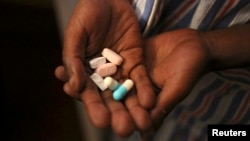Just a decade ago, South Africa was a grim place for AIDS sufferers - and worse for pregnant women, who had no access to drugs that would prevent them from giving the life-threatening virus to their babies. That changed when a group of South African patients stepped forward and sued for access to cheaper drugs.
Suing for change
Hazel Tau says she remembers the dark days of HIV in South Africa, the nation with the world’s highest burden of the disease.
But the 45-year-old is not talking about the now-distant year of 1991, when she was first diagnosed with HIV. She is talking about her decision in 2002 to reveal her status to the entire country by suing in South African court for access to cheaper AIDS drugs, which were then behind a high wall of patent protection. At the time, she was working as an HIV counselor and spending more than one-fifth of her pay on medication.
In winning that landmark case, she became the mother of a cause, and the results have been living and breathing HIV-free babies. Her fight to bring down drug prices also enabled widespread availability of preventive medicines for pregnant, HIV-positive women. Today, transmission rates between mothers and children hover below three percent in South Africa.
Free medication
And for that, this World AIDS Day more than two decades after her diagnosis, Tau says she is thankful that she, and about 2.5 million South Africans, have access to free AIDS medicine.
“Things are much, much, much better. Treatment, access to treatment to prevent the unborn baby [from contracting HIV]. For people who have tested positive, treatment is accessible and there are different regimens of treatment,” said Tau.
Doctors Without Borders head HIV/TB coordinator for Southern Africa Eric Goemaere says much has changed since he arrived in South Africa in 1999.
“While everybody speaks about reducing incidence, reducing new infection, it is extremely difficult to do with sexual transmission. But in this case, mother-to-child transmission, actually it is an easy-to-do intervention. ... When I arrived here, we had something like 20, 22 percent transmission - meaning one mother [out of] five would give birth to an HIV-positive child. And it has been reduced now to 2.7 percent nationwide, so it is one-tenth of this. Still too many, it should not exist anymore, that is something that is an easy intervention to do, it is something that should be eradicated, like it has almost been eradicated in the Western world,” he stated.
Treatment extended to all women
Dr. Goemaere and Tau say the fight now is to extend antenatal treatment to all women in South Africa and bring the mother-to-child transmission rate down even further. Many women in poor and rural communities do not receive antiretroviral treatment in time to prevent their babies from contracting HIV - and so, to this day, thousands of South Africans are born with this chronic disease.
Tau says she would sue all over again. She says she has 24 compelling reasons to do so. “It is why now, I am an activist, and I am working class, and I am a breadwinner. I have got a mother, I have got siblings, I have got 23 siblings, and I am looking after them,” she notes.
But her legal victory came too late for her. Tau never became a mother, her husband packed up and left shortly after learning of her status, and her diagnosis came during the grim days when AIDS patients were advised to not procreate at all.
But this World AIDS Day, millions of HIV-free babies in South Africa owe their health to the fruits of her labor.




